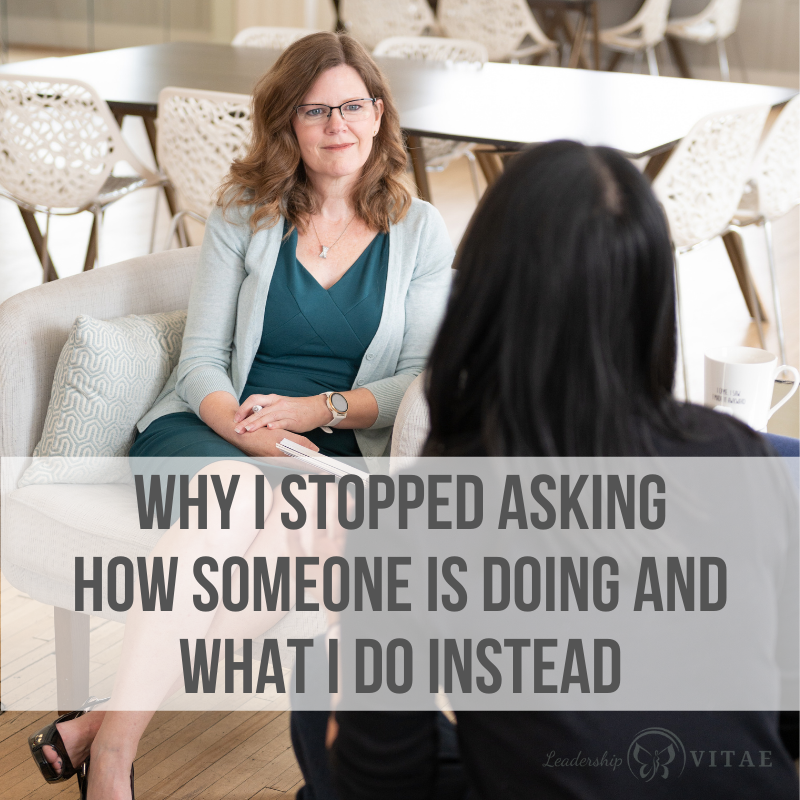
“How are you doing?” It seems like such a simple question. Yet now, in this time, it is anything but.
We are into year 3 of a global pandemic. More wars threaten. Things are unequal, unstable, and uncertain.
How do you think I’m doing? About the same as everyone else. Okay, yet not okay. Because how can any of us really be “fine” with all the turmoil going on?
Which is why I don’t want to ask “how are you doing?” anymore. I know the answer. You know the answer. And many of us are tired of thinking about, talking about, and living through the constant instability.
I was sitting in a Panera writing, waiting for my son, when a song came on. It reminded me of something he and his friends say in greeting one another. I never thought I’d look to Gen Z, or my teenage son, to rethink how I interact with others. Yet, here I am.
“Tell me something good.”
A gentle request in difficult times
The song is by Rufus by a glorious Chaka Khan. It’s for a different intent. A man, with no feeling inside, and a woman who wants to set his heart and body on fire.
Yet aren’t many of us struggling with our feelings right now? Afraid to feel or overwhelmed by our feelings?
“Tell me something good.”
When we consider something good, it changes our perspective. Pulls us out of the what-ifs, worries, and struggles we may be experiencing.
It’s a wonderful gift. Even if we have to take a hot minute to identify something, anything, to be positive about, it’s a reminder that there is good going on in our lives. Things we can be joyous and grateful for.
Shift the balance
We are wired to look for threats in the environment around us. As a result, we are mindful of things that will send us into threat state.
We’re pre-wired to find the bad stuff. Anticipate. Fear. Infer. We can often sniff out negativity a mile away, and sometimes attribute it to a person or situation before knowing whether it’s true.
As a result, we must go out of our way to look for good things in our lives.
There have been numerous studies with various ratios of how much positive interaction we need to offset negative. For example, Gottman and Levenson developed the 5:1 ratio for relationships. Their studies demonstrated that healthy relationships needed five positive interactions for every negative to avoid divorce.
Whether the studies are performed in classrooms, homes, or work environments, the evidence is clear. We need more positive experiences to offset negative ones.
“Tell me something good.”
Be the shift
When we ask “how are you doing?” we often don’t really mean it. Whether we are on the run between meetings, or doing it as a courtesy to be polite, we are rarely expecting the raw truth.
We each can positively impact those around us by asking, and really listening. Whether it’s “how are you?” or “tell me something good” we have an opportunity to connect. To receive the gift of knowing what is happening on someone else’s journey.
Years ago, I stopped asking how people were doing in passing unless I could take the time to stop and really listen to the answer. I’m not interested in being superficially polite. Instead, I stop, look someone in the eyes, and ask with an intention to receive.
During the pandemic, I also started answering honestly when someone else asked me how I was doing. The first time they experience an unexpected truth, the response is often the same “Oh, we’re sharing how we’re really doing.”
Yes, let’s do that. Let’s ask because we want to know AND answer like we mean it. We can practice and model human connection in this time of great disconnect.
“Tell me something good.”
Focus on the positive first
The next time someone asks you how you’re doing, pause. Consider one good thing going on in your life to share. Wade passed the mountains of what-ifs, worries, and struggles to find one positive thing.
It doesn’t mean times aren’t difficult. Or you’re being naïve to all the craziness in the world. It just means you’re retraining your brain to think of the good thing FIRST instead of last.
When someone else tells you how THEY are doing, be an empathetic listener. They may be weary, frustrated, or afraid. Acknowledge and sit with them and their story. Gently, if and when the moment feels right…
”Tell me something good.”
Asking someone to tell you something good in their lives does not dismiss their difficulties. Instead, it’s a kind reminder that we can have both positive and challenging moments going on in our lives.
It’s an opportunity to bring light into a dark time. Something we could all certainly use.









8 Responses
I love this! Such a small shift can make a huge impact. I’m starting this today both professionally and personally.
Thank you Amy. The more we share with those around us, the more we can establish a consistent positive habit as well.
What a wonderful more meaningful way to connect!
The richness of lessons to learn from the simple, “Tell me something good” gives opportunities for both the one sharing and the one asking. If I am asked to “tell something good”, I have to focus on my blessings. How powerfult!
As the listner, I have to “hear between the lines”. Is it time to just rejoice with or is it time to ask more?
So special….
Great point Pansy. Listening for the good, rather than the potential negative, is also something we can practice. It’s too easy to allow our brains to focus on others’ possible negative messages ahead of positive ones as well. Thank you for the reminder.
Kristin, I like to say, “How are WE doing today?” with a big smile, whether it is a friend or a stranger. Almost always gets a smile back, and establishes a little sense of community, I think.
What a great suggestion Ray. Smiles are contagious and I’m sure that helps many a person reframe, if even for a moment, bringing more light in. Thank you for sharing.
Nicely put; we do need to be more self-aware about always focusing on the negative as a vestige of survival. That 5:1 rule for marriage is 7:1 in marketing. Research informs us that when there’s a negative experience with a product or service, we tell seven people, compared to one person when there’s a positive experience.
While the ratios are different, every study I looked at told a similar story. Your example from Marketing is also why it’s so important to focus on advocacy early in a new role or project. You’ve got my brain going…I’ll have to dig in more. Thank you Allegra!